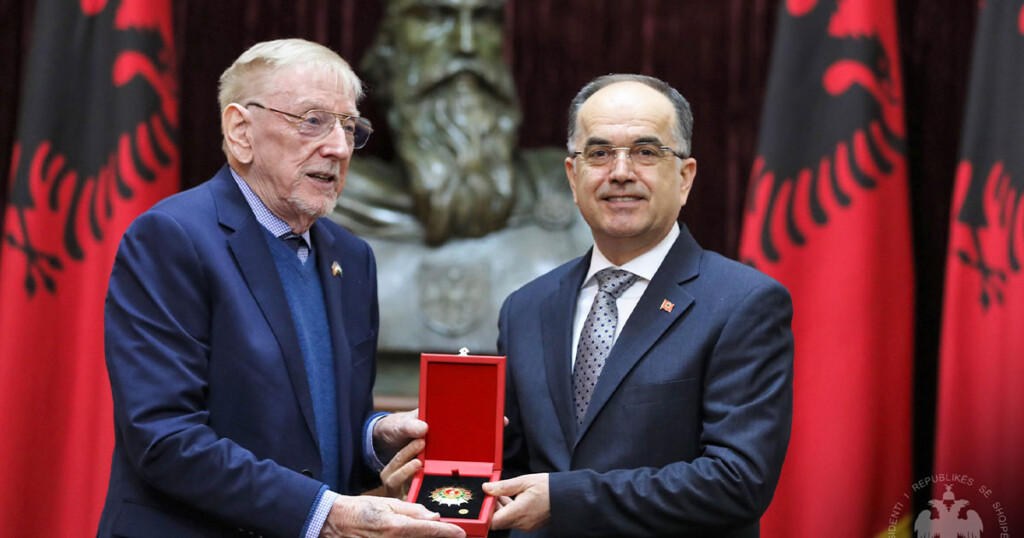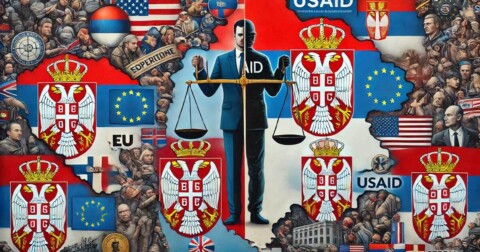The Forum for Security and Democracy (FDB), yet another in a long line of non-governmental organizations whose very name suggests some noble concern for democracy, while in reality working diligently to undermine state interests, has announced—through pro-Western and foreign portals—that it will compose some sort of “independent report” on alleged police brutality in Serbia. This is not the only NGO that, through its anti-Serb activities and commissioned reports, seeks to further complicate Belgrade’s position, already burdened by numerous pressures from Brussels.
The work of this obscure and at first glance marginal organization is neither naïve nor harmless. The published reports of the FBD suggest that this self-proclaimed analytical center faithfully follows the political narratives of Pristina, Zagreb, Sarajevo, and Brussels. The positions presented in their texts are openly anti-state and anti-national; in other words, the approach and methodology reduce Serbia to a country that supposedly stumbles over “malign influences,” and that, in order to learn how to breathe with European lungs, must renounce its own security doctrine, accept imposed guilt, and submit to a revision of history.
IF SERBIA DOESN’T KNOW, JOVANOVIĆ KNOWS
NATO is the ideological framework of the Forum for Security and Democracy, and Russia–NATO relations are its main foundation. If we want to understand the intentions of the NGO Forum for Security and Democracy, as well as the language used by its authors, it is enough to analyze any of their texts—what they themselves call “reports.” Let us focus on three of them.
A paradigmatic example is the publication “Russia–NATO Relations: What Is Little Known and Even More Silenced in Serbia,” signed by Milan Jovanović, the president of the FBD. What immediately stands out is that this document was not created as the result of research, but by copying the political program of the NATO alliance. In the introductory paragraph, the author literally writes:
“In none of the former EU candidate countries, which are today its members, has there ever been a situation like the one we are witnessing in Serbia. Nowhere, namely, was it common that, parallel to the significant steps taken by the authorities of the candidate country in order to accelerate its path toward EU membership, one could simultaneously observe in that country the absence, or even intentional suppression and avoidance, of pointing out the importance of the strategic partnership between the EU and NATO; and especially the interpretations by EU member states that refer to NATO as the guarantor and foundation of the Union’s security and defense policy, in which Serbia also wishes to be a member.”

When someone in Serbia, in a publication intended primarily for a Western audience but allegedly written from a Serbian standpoint, publishes a document that is pure NATO propaganda and declares it a “fact,” then any further investigation into the character of that organization becomes unnecessary. For what we are dealing with is not a domestic analytical center, but a mouthpiece of foreign structures, one that tailors its work to the interests of those whose documents it translates, rather than to the interests of its own state.
ATTITUDE TOWARD NATO — AS A MEASURE OF OUR MATURITY
On page three, the author goes even further and positions NATO as an inevitable axis of Serbia’s future, while describing Serbia’s attitude toward the Alliance as a measure of our “maturity.” He writes:
“Nowhere in analytical, media, or political commentaries has it been customary to avoid pointing out the importance of the strategic partnership between the European Union and NATO. Even less so to avoid pointing out the interpretations of EU member states that refer to NATO as the guarantor and foundation of the Union’s security and defense policy, of which Serbia also wishes to be a member.” (p. 3 of document VIP-10)
This position is more than mere inclination — it reflects a belief that Serbia’s place is wherever NATO assigns it, and that any distancing on our part is not only a political mistake but, as will later be shown, the result of “harmful influences,” “delusions,” or most often “Russian propaganda.”
The author then moves on to what always follows in such texts when a nation must be “explained” why it is not good to think outside the predetermined framework. He presents an entire series of falsehoods, that is, he claims without any basis:


Such claims are neither intellectually honest, nor politically responsible, nor analytically grounded. They are a classic example of how every disagreement with NATO structures and EU policy is automatically declared a consequence of Russian influence. Even more indicative is the fact that in the entire publication there is not a single sentence containing a critical reflection on NATO. On the contrary, the entire document reads like a defensive line in favor of the Alliance, regardless of actual facts, history, or consequences. The most illustrative example is the paragraph in which Jovanović refers to the NATO aggression of 1999 as a “legitimate” action. On page 25, he literally writes:
“It is claimed — incorrectly — that the NATO intervention in Kosovo was not legitimate.”
AND WHAT ABOUT THE KILLED CIVILIANS, MONASTERIES IN FLAMES, DEPLETED URANIUM?
Then, on page 25 of the same document:
“NATO’s operation in Kosovo followed more than a year of intensive efforts by the UN and the Contact Group, of which Russia was a member, to find a peaceful solution. As a threat to international peace and security, the UN Security Council repeatedly condemned ethnic cleansing in Kosovo and the growing number of refugees driven from their homes. NATO’s Operation Allied Force was launched to prevent broader and more lasting violations of human rights and the killing of civilians.”
What is presented here is not merely a political position but a profound inversion promoted as a “fact.” There is no mention of the killing of Serbian civilians, the expulsion of Serbs from their homes, the burning and destruction of Serbian churches and monasteries, the actions of Albanian terrorist organizations, organ trafficking, Serbian towns turned into ruins, the expulsion of Serbs, cluster bombs, or depleted uranium. Instead, NATO is portrayed as a protector, and Serbia as a country in which “worse crimes were prevented.”
This narrative continues elsewhere in the document as well, so on page 7 NATO expansion is described as a “contribution to peace and stability.”
Hanging in the air is the question of what kind of reality someone lives in if they believe that all the countries that joined NATO did so without pressure, ultimatums, sanctions, or political blackmail. But for the author from the FBD, these are not the topics. What matters to him is to present Serbia as a country that must align itself, because anything else is a “danger” or a “delusion” or “Russian malign influence.”
A FEW FABRICATIONS ABOUT BANJSKA
The document “The Banjska Case – Legal and Political Issues,” signed by Luka Jovanović, reads as if it was written in an office in Priština or in the communications department of one of the “peacekeeping” missions in Kosovo and Metohija. What is supposed to be a legal–political analysis—signed, moreover, by someone presenting himself as a lawyer—is in fact a heap of scattered personal opinions without any legal basis, which indicates a lack of even elementary knowledge of international law.
From the first to the last page, the author ignores the legal framework of Kosovo and Metohija, the role of KFOR, Resolution 1244, as well as the fact that Serbia does not recognize the occupied Kosovo institutions. All of this is simply skipped because it obstructs the chosen political construct.
And then we find long paragraphs explaining how the NGO views the north of Kosovo and Metohija, and how it views the Serbs from this area in general.
Throughout the entire text, the author refers to the occupied territories as the independent state of Kosovo, grants full legitimacy to the occupation regime of Albin Kurti, and directly accuses Serbia of having a poor relationship with Brussels because it seeks to protect “Serbian terrorists.”
“First, it seems that the Kosovo institutions, despite the diplomatic offensive visible since the outbreak of the incident itself, have not made sufficiently measurable progress in their investigation. Although the Kosovo police seized a large quantity of weapons after the incident and despite the fact that several participants in the events of September 24 are being investigated by the Kosovo authorities, most of the evidence and individuals involved in these events are located in the Republic of Serbia. The primary suspect, Radoičić, is in Serbia, where he is currently under investigation for criminal acts suspected to have been committed on the territory of (central) Serbia, and—as we have previously pointed out—it is legally almost impossible for him to be extradited to the Kosovo authorities. In that sense, advocating for an international investigation for Kosovo represents potentially the only way—albeit an indirect one—to obtain evidence (though likely not the suspects themselves) necessary for the Kosovo prosecution to file proper indictments before Kosovo courts.”
The author, without any reservation, recognizes the Kosovo institutions as legitimate. He claims that Serbia, through the Brussels Agreement, recognized Kosovo’s statehood, although this would imply recognition of the independence of Kosovo and Metohija—which did not occur. Jovanović does not mention Resolution 1244, which defines the security framework and the conditions under which Albanian “police officers” may move—who, without the presence of KFOR personnel, are not permitted to be in the north of Kosovo and Metohija, especially after Serbs withdrew from the so-called Kosovo institutions in 2023. The text, therefore, proceeds from the assumption that Kosovo’s institutions are equal to Serbia’s institutions, and that it is natural for Serbs to be tried there.
THE KOSOVO INDICTMENT – THE STARTING POINT OF THE ANALYSIS
Another example—this time even more explicit—where the author relays the narrative of a “international investigation,” but in a way that assumes the full validity of Kosovo’s legal actions:
“ The Kosovo authorities, as well as all international mediators in the Brussels dialogue, treat this event as a terrorist act, while in Serbia the focus is on suspicions that Radoičić’s group illegally acquired weapons that were transferred from the territory of Serbia to Kosovo. It is clear, therefore, that Serbia and Kosovo officially view the events in Banjska from very different perspectives, which have influenced their legal qualifications of this incident. Precisely because of this large gap, calls for an international investigation are beginning to gain increasing significance.”
This block clearly shows that the Forum for Security and Democracy sees only the Kosovo institutions and “international mediators” as legitimate actors, while Serbia’s position is portrayed as an obstacle to the global truth.
An even more drastic example appears on page 15, in the section “The Banjska Case – One Year Later,” where already in the first sentence the term “so-called incident” is used, which is a direct quote from the Kosovo indictment:
“On the eve of the anniversary of the so-called incident in Banjska, and especially after the Kosovo prosecutor’s office filed its indictment against Milan Radoičić and more than 40 other individuals, qualifying that incident as a terrorist act, the issue of the events of September 24 in Banjska once again became relevant in the domestic public. And while domestic and regional media were publishing details from that indictment, it naturally raised the question of how far the judicial authorities of Serbia have progressed in their own investigation.”
The Kosovo indictment is set as the primary document, while the work of the Serbian prosecutor’s office is presented as secondary—and as the side that is hiding “terrorists.”
DEEPEST CONCERN, ACCORDING TO THE FBD
The final example—perhaps the most extreme—appears in the section that the FBD added as an annex: “FBD Statement of 25 September 2024,” where they openly speak of “Serbian paramilitary formations” and the “danger to the Brussels Dialogue.”
“The Forum for Security and Democracy, while issuing the strongest condemnation of the emergence of still unidentified paramilitary formations, also expresses its deepest concern regarding their clash with Kosovo police forces in the north of Kosovo, which represents the greatest and most direct danger and threat so far to the successful conclusion of the Brussels Dialogue, the implementation of the Franco-German plan, and security in the region.”
The FBD believes that Serbia must—if it does not wish its commitment to these processes to be called into question—use all of its intelligence and diplomatic capacities in order to gather information and answers to the questions of how this occurred and who is behind the encouragement of paramilitary organization among the local Serbian population in the north of Kosovo and its incitement to armed clashes, which ultimately resulted in the events near the village of Banjska.
“The FBD emphasizes that such information and answers are important not only for maintaining the good relations and the understanding Serbia and the EU have had so far regarding the importance of the Brussels Dialogue and agreements, but also for preserving and strengthening the internal democratic and security capacities that events and methods similar to those witnessed yesterday in the north of Kosovo could seriously undermine.”
And perhaps even more extreme is the statement from 2023, where there is no room for doubt that the author views Serbs as terrorists and the Albanian occupation regime as a legitimate part of an independent state:
“Following the news of the indictment issued by the Kosovo prosecutor’s office for the incident in Banjska, the Forum for Security and Democracy believes that it should be treated in Serbia with full political seriousness.”
The FBD emphasizes that this applies to political structures in both government and opposition, as well as to the state itself, and especially to the Higher Public Prosecutor’s Office in Belgrade, which—as stated in the document—was entrusted nearly a year ago with a serious and important task: to investigate all circumstances related to that incident.
“The FBD expects that the indictment from Priština will primarily encourage the Higher Public Prosecutor’s Office to continue its assigned work more vigorously, before both the domestic and international public, and expresses concern that yesterday’s statement by the Higher Public Prosecutor—namely, that the indictment from Priština is of no relevance to Serbia as a state—could prove counterproductive and a complicating factor precisely for Serbia as a state.”
In this context, the FBD recalls that Serbia, during the Brussels Dialogue, has already undertaken a series of obligations, among which was the acceptance of the jurisdiction of Kosovo’s judicial authorities over the entire territory of Kosovo, and that until last year the Serbian community there participated in their work, as well as in the Kosovo police.
The document “Anonymization of War Crimes and War Criminals in Serbia,” signed by Lanabi La Lova, Denisa Kostovićeva, and Timothy William Waters, offers far deeper and more politically far-reaching conclusions than those suggested by its title. Instead of a purported legal study, we have a text whose sole purpose is to standardize, expand, and reinforce the idea of Serbia as a society that not only has not undergone any process of confronting its past, but allegedly works in an organized and systematic manner to conceal its own crimes.

Already on the first page there is a long paragraph that sets the framework for the entire document:
“In Serbia, thirty years after the wars, a pattern of denying responsibility is still maintained, permeating public institutions, cultural practices, and political life. This pattern is reflected in the relativization of the Hague Tribunal’s verdicts, the public glorification of convicted criminals, and the systematic silence regarding crimes committed against non-Serb populations. Serbia as a society, despite formal legal obligations, has not done enough to ensure accountability for war crimes committed, nor to recognize the suffering of the victims.”
Here we clearly see what forms the basis of the entire document: Serbia is presented as a unified, homogeneous, collective subject that “maintains a pattern of denial,” which is a purely political label. It does not speak of an institution, an actor, a decision, or a policy, but of “society” as a whole.
On page 3, the authors continue in the same spirit:
“The dominant narrative in Serbia rests on the idea that Serbs in the wars of the 1990s were victims of great historical injustices, while the crimes committed by Serbian actors are portrayed as incidents or reactions to the actions of others. This narrative not only distorts the facts but prolongs the collective inability to accept responsibility. Serbia continues to cultivate a culture of selective memory, in which the victims of other peoples are pushed aside, while only Serbian suffering is emphasized.”
The most openly ideological segment is found on page 5, where the author literally prescribes what Serbia “must” accept as historical truth:
“Serbia must accept the established facts about the nature of the wars in the former Yugoslavia: that the political and military structures of Serbia played a key role in organizing and carrying out campaigns of ethnic cleansing. As long as Serbia refuses to accept this reality, lasting peace in the region will not be possible.
Denying or relativizing responsibility represents a continuation of violence against the victims.”
There is no need to remind anyone that the text is written in the spirit of the “truths” produced by William Walker, whose role in the bombing of Serbia was crucial. And yet, even though the truth about Račak eventually reached the public—and even though it was established that it was not a civilian massacre, unlike the NATO bombing, which was indeed a crime against civilians—Walker never abandoned the narrative that portrays Serbs as criminals and the terrorists as victims.
In the article mentioned, the authors further claim:
“In Serbia’s public sphere, there is almost no willingness to open a serious dialogue about Serbia’s role in the wars. Political elites systematically suppress information about responsibility, while the media and cultural institutions maintain the myth of Serbian suffering as the only relevant truth. Unless this pattern is broken, future generations will grow up with a deeply distorted image of the past.”
These three paragraphs, among the mildest in a document that contains forty pages of historical revisionism, label Serbia as the sole culprit, without any mention of Serbian victims—which clearly reveals the intent and the ideological construction behind the text.
THE POLITICAL PROFILE OF THE FBD – WHAT THE TEXTS REVEAL
The Forum for Security and Democracy, through its written record—not through anyone else’s interpretation—presents itself as a structure that operates in accordance with the diplomatic and security narratives of Western institutions, and not as a domestic independent organization that observes events from the standpoint of truth and established historical facts, and above all, from the standpoint of the current situation and position of the Serbian people.
Therefore, the announced report on “police brutality” is a logical continuation of an already fully shaped pattern. If someone has spent two decades writing and promoting authors who, as authorities, follow the views of proven enemies of the Serbian state and the Serbian people—such as William Walker—or who, even more astonishingly, claim that the NATO aggression was legal and necessary, then it is not difficult to conclude in what tone the analysis of the work of the Serbian police will be written.





